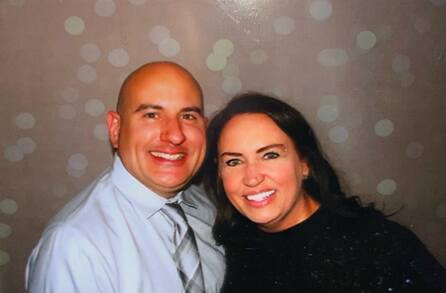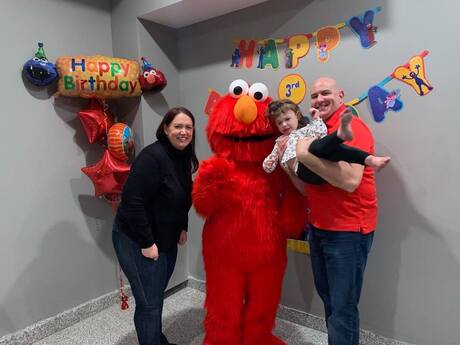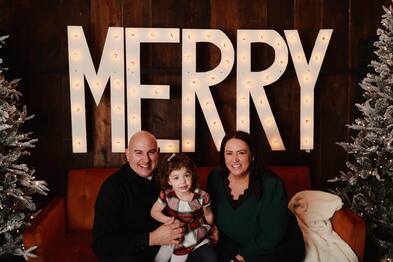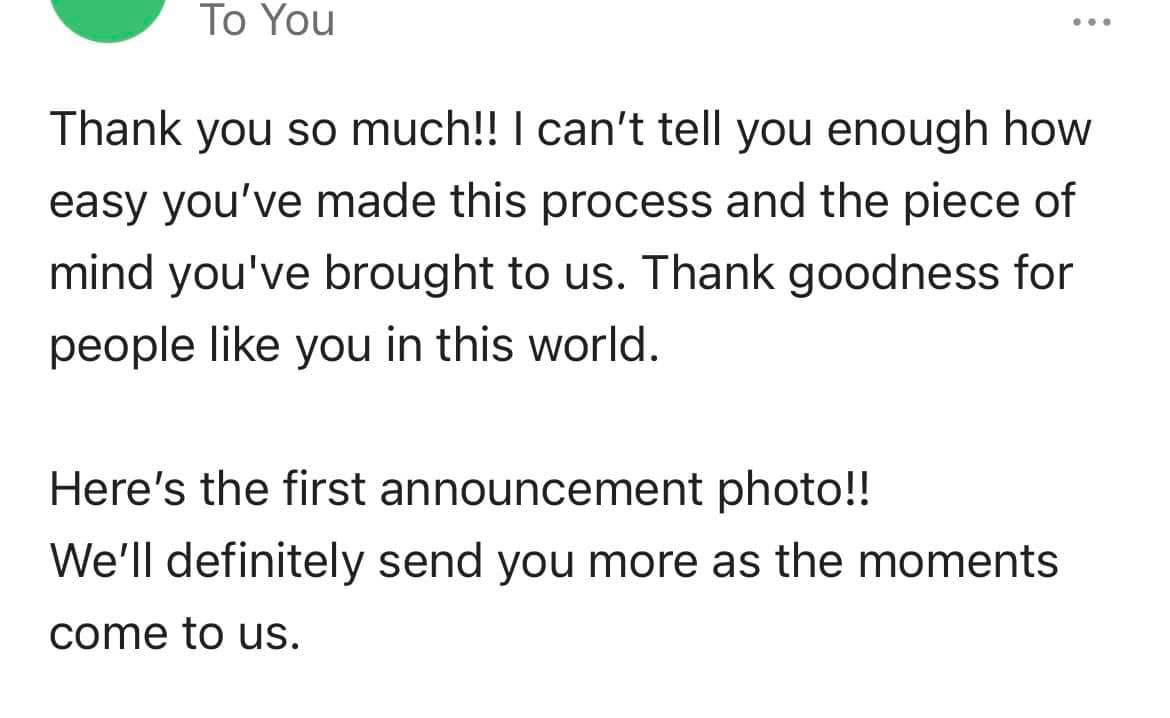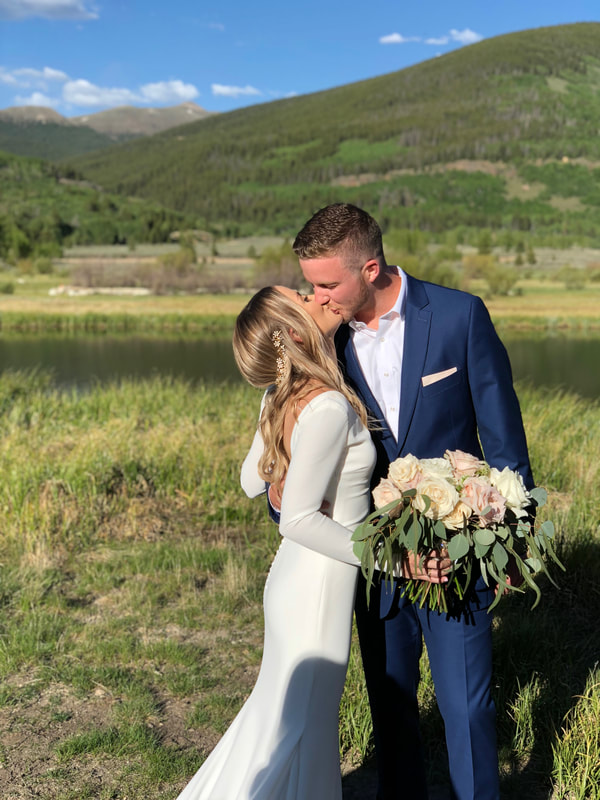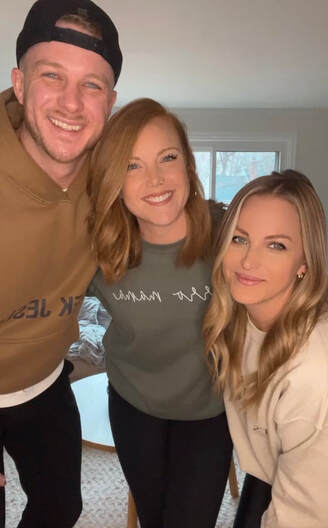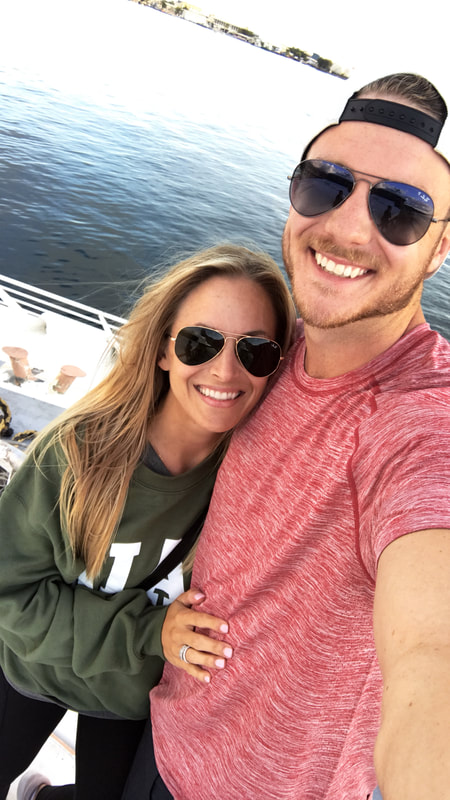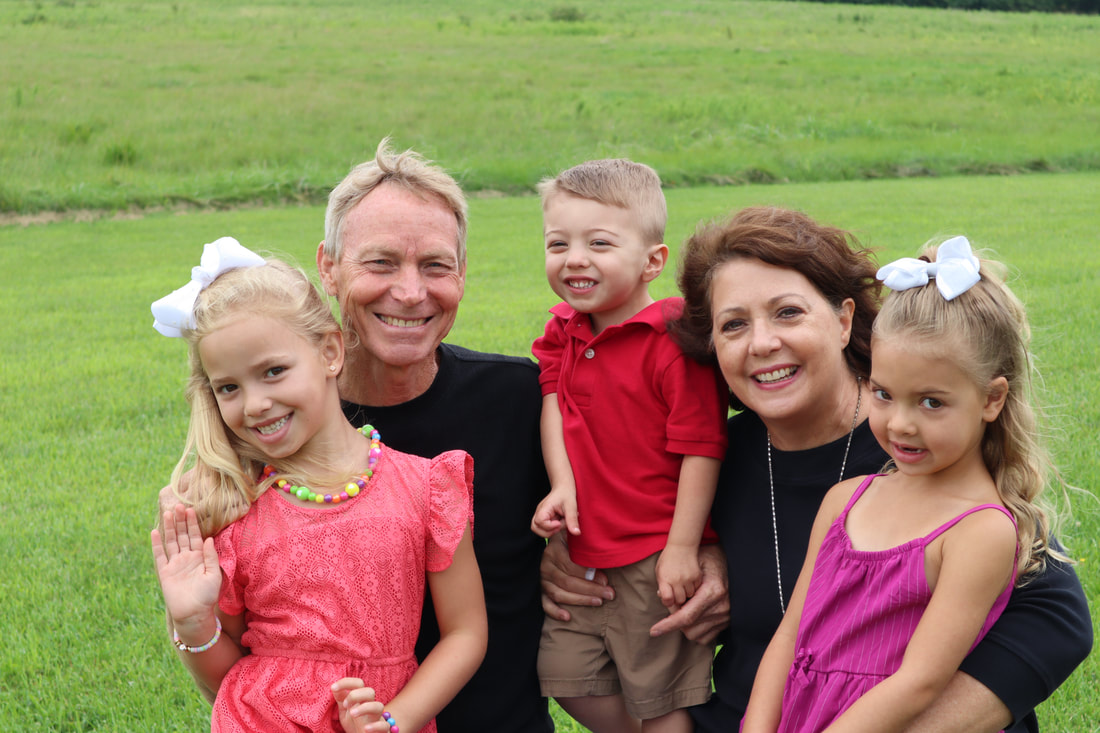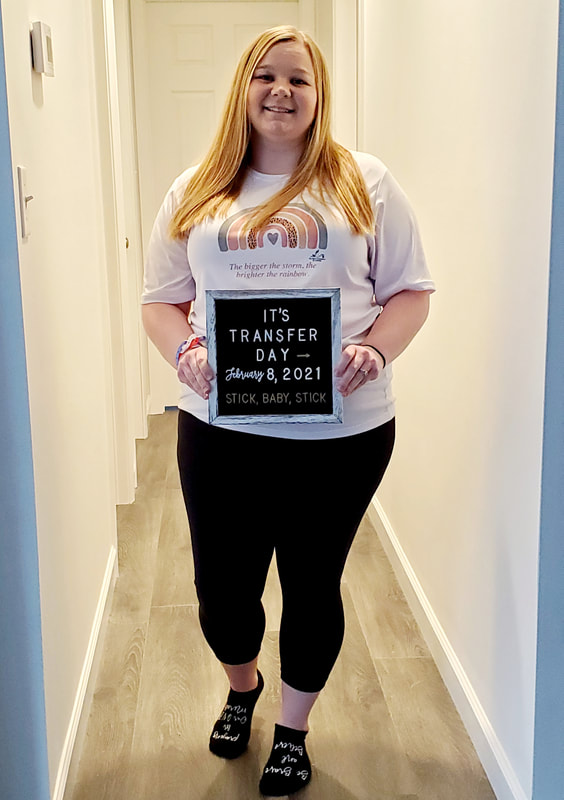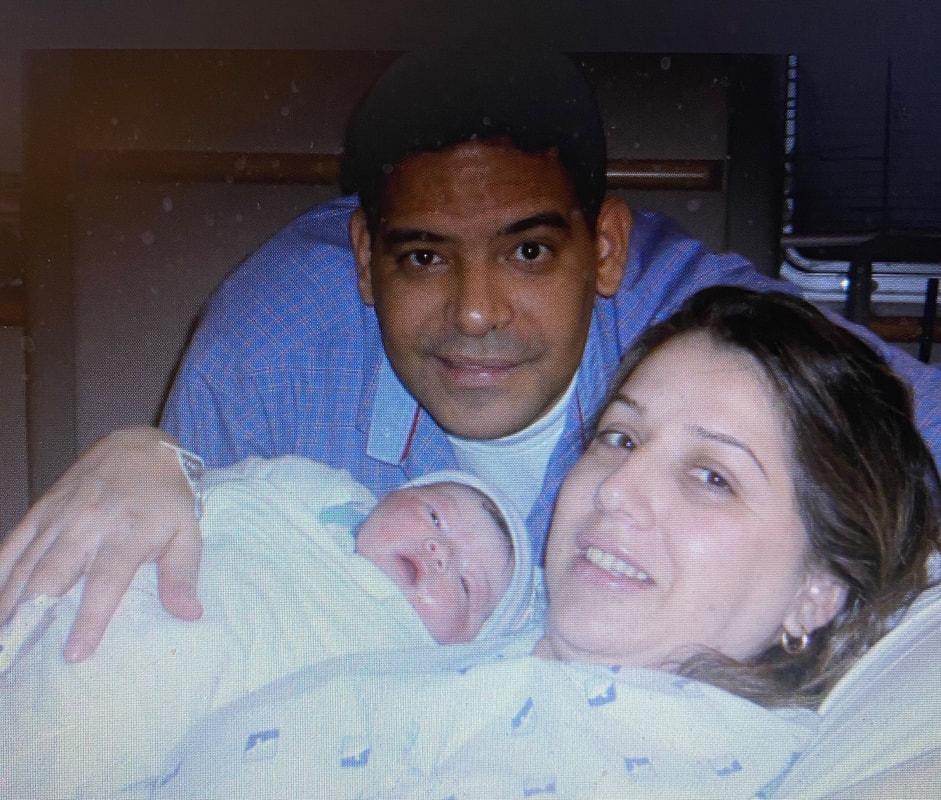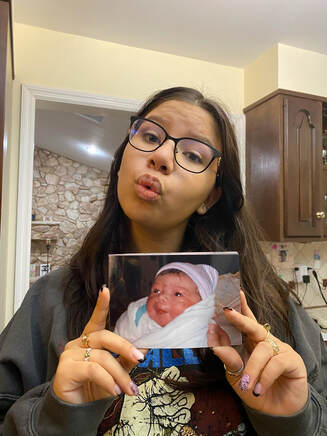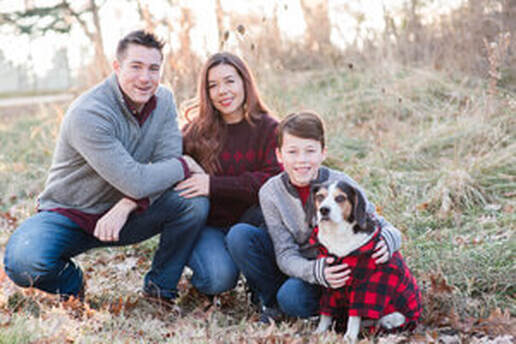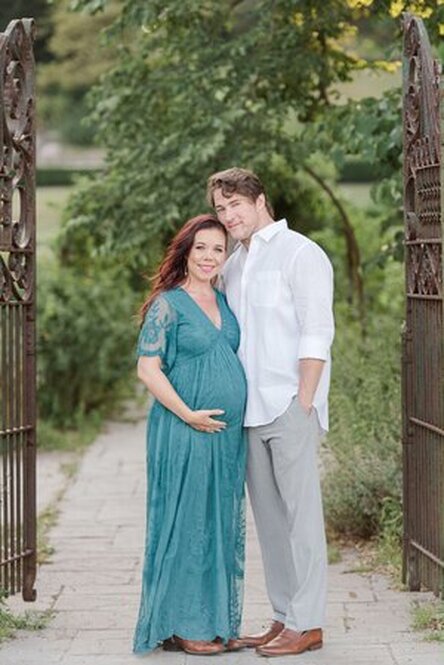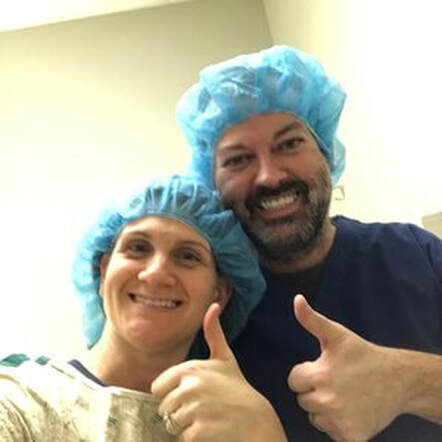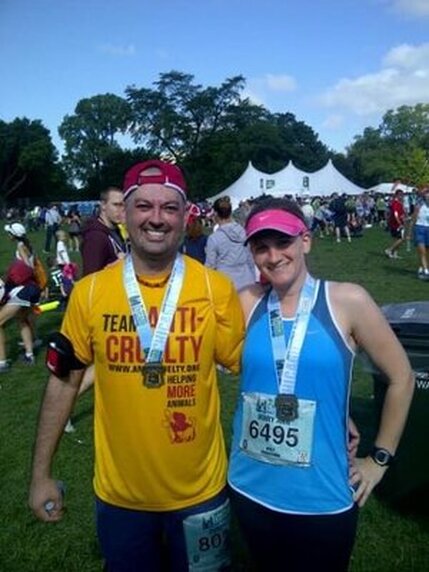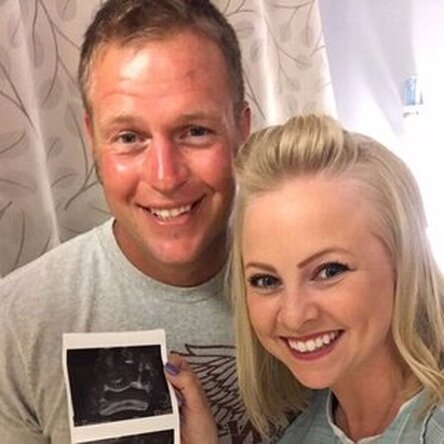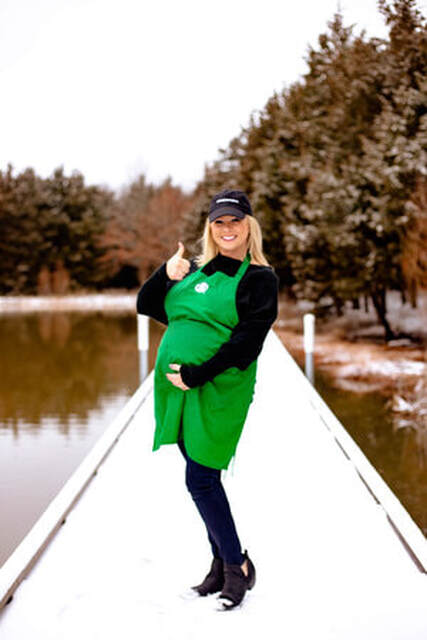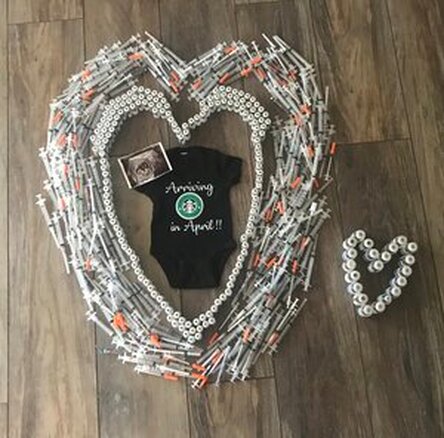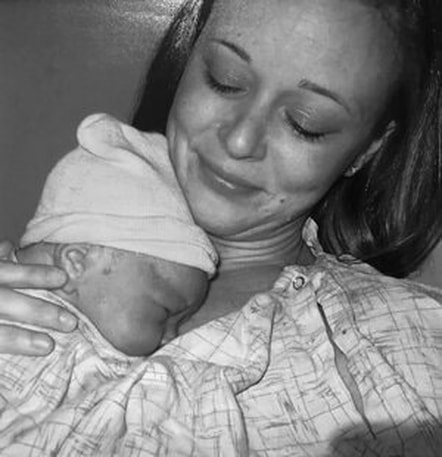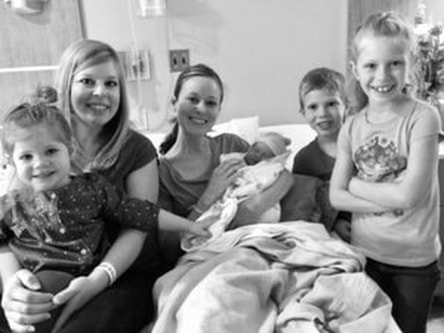July 7, 2023
FINDING YOUR TRIBE - What I Would Have Done Differently
Every path to parenthood is unique and special, often bringing generations of family together. Within the infertility community, many parents struggle to connect and share common feelings during the process of creating their families. Connection can be a bridge to resources and well-being, especially when it comes to financial burdens and stress. Jen Francis reflects on her experience navigating infertility alone and empowering other individuals who suffer from infertility to discover resources in the infertility community.
For us, this was great news. We had answers and a plan….but shortly after our consult we found ourselves in a very sterile, uninviting room as we waited to meet with the billing coordinator and we found out that we didn’t have any coverage and they were expecting us to go through 4 rounds of IVF and that would require upwards of $100,000. This was a huge blow to us as we were in the midst of building a house and did not have the funds and to make matters worse, I had just suffered a pregnancy loss and we were just so ready to move forward with our family.
|
I did some digging and found out that Starbucks offered fertility benefits, so I tried to convince my husband that I would take this job, but I was already working 70+ hours a week, so that wasn’t necessarily a viable option.
|
We found out that we didn’t have any coverage and they were expecting us to go through 4 rounds of IVF and that would require upwards of $100,000. This was a huge blow to us." |
A short time later, I ended up losing my job and my father-in-law, helped us with a new insurance plan. Much to our surprise I went back to my OB shortly after for a DNC and he brought up the conversation of IVF. In that moment I broke down and told him we didn’t have the money, but he reviewed our policy and said that we did indeed have coverage now.
And so the rest is history. I have a daughter she will be three and a half next week and we are forever grateful for her and with our experience with loss and the struggles of infertility, we are big advocates for those in the weeds now. I’ve even joined the family business and I now educate and write policies for women across Illinois who are looking for plans that include fertility coverage. I’m often referred to as the fertility insurance guru and that’s a badge I proudly wear. I’m here for this community and want to help as many individuals and couples achieve their dreams of having a family.
And so the rest is history. I have a daughter she will be three and a half next week and we are forever grateful for her and with our experience with loss and the struggles of infertility, we are big advocates for those in the weeds now. I’ve even joined the family business and I now educate and write policies for women across Illinois who are looking for plans that include fertility coverage. I’m often referred to as the fertility insurance guru and that’s a badge I proudly wear. I’m here for this community and want to help as many individuals and couples achieve their dreams of having a family.
Why are they not addressing our fertility and letting us know what happens as we age and wait longer to start families?
I think it’s great that women are taking advantage of career opportunities and choosing to have kids when it’s right for them, but we need to get the healthcare providers to start sharing this valuable knowledge about fertility preservation and even offering some diagnostic testing earlier just to give us some insight into our fertility. There needs to be better education.
Overall people dealing with infertility should have more options and should be able to pursue growing their family without the financial constraints. When it comes to fertility medicine, it’s very different from the rest of the medical professions where there are no payment plans in many cases and the money is needed today. I hope to see more coverage options in the near future to help those patients who currently face paying for the entire process out of pocket. It’s really not right.
I think it’s great that women are taking advantage of career opportunities and choosing to have kids when it’s right for them, but we need to get the healthcare providers to start sharing this valuable knowledge about fertility preservation and even offering some diagnostic testing earlier just to give us some insight into our fertility. There needs to be better education.
Overall people dealing with infertility should have more options and should be able to pursue growing their family without the financial constraints. When it comes to fertility medicine, it’s very different from the rest of the medical professions where there are no payment plans in many cases and the money is needed today. I hope to see more coverage options in the near future to help those patients who currently face paying for the entire process out of pocket. It’s really not right.
|
What is your number one advice for someone just starting out with IVF?
Find your tribe. I think that’s the missing piece of what I would have done differently. Find a community, a group of friends, or even strangers that you relate to. It’s important to have a support network outside of your spouse or significant other. There are so many resources available now that you can find so much of what you need by connecting with others. |
I was so embarrassed to be in the groups back then, but looking back I laugh because here I am sharing my story with the world now. I was ashamed to be in the groups and to share what we were going through. I was even in therapy at this time and still didn’t feel right sharing with the outside world even if it may have been obvious to some that we might have been going through some struggles with starting a family.
I now realize how lonely that journey was and I could have had this support and shared my story. With nearly 1 in 6 struggling to conceive, it impacts so many people and there are so many that have a similar story to mine and I now see that I can have a positive impact on those around me by being open and sharing my journey.
This journey is extremely tough and at some point you will need a shoulder to cry on, so it’s important to find your tribe. You don’t have to share all the details and you can be selective in who you share with, but just make sure you surround yourself with the support network you need.
I now realize how lonely that journey was and I could have had this support and shared my story. With nearly 1 in 6 struggling to conceive, it impacts so many people and there are so many that have a similar story to mine and I now see that I can have a positive impact on those around me by being open and sharing my journey.
This journey is extremely tough and at some point you will need a shoulder to cry on, so it’s important to find your tribe. You don’t have to share all the details and you can be selective in who you share with, but just make sure you surround yourself with the support network you need.
Find your tribe. I think that’s the missing piece of what I would have done differently. Find a community, a group of friends, or even strangers that you relate to. It’s important to have a support network outside of your spouse or significant other. There are so many resources available now that you can find so much of what you need by connecting with others. " |
Do you feel that there has been a change in the stigma surrounding infertility these past few years?
I do! I remember not wanting to share my own story and feeling embarrassed. I felt so different from everyone else in my family. I have these cousins where we would joke they could get pregnant so easily and here I was struggling to stay pregnant and I just didn’t feel that we could relate and there was no one talking about infertility and the struggle to have kids. |
It seems so different now though. People are talking about it everywhere. Celebrities are coming out about their struggles, even Kourtney Kardashian and Paris Hilton have been sharing about their IVF journeys and I feel this has started to make others feel more comfortable sharing. People are now sharing their stories at backyard barbeques and the conversation about fertility is starting to really take off. I even think about the future and the conversation I’ll be having with my own daughter. I really do think the stigma is starting to fade and I think once my daughter is old enough to have these discussions that it will be an everyday conversation and something doctors readily address.
|
The Stork Foundation for Infertility appreciates individuals, professionals and organizations that advocate for the larger infertility community in countless ways. Special thanks to Jen for both sharing your story and being a dependable source of knowledge for those enduring the financial stress of infertility!
|
March 25, 2023
WITH HOPE AND FAITH - The Miracle of Surrogacy
After tremendous loss, Kelly Eckley and her husband Jordan Eckley were at a turning point in their infertility story. Although they were weary, they ached for a new, fresh ending. While deep in the process of grieving so many pregnancies and the children that they had already loved so much, someone offered them a newfound hope that was so indescribable. With immense faith, they trusted this new beginning.
Unlike other infertility stories, you were able to get pregnant easily, but the test was for you to stay pregnant.
Exactly. I am an odd case where I can actually get pregnant easily, but I can’t sustain a pregnancy. That was another huge hurdle for us because doctors were not taking us seriously. It was almost as if they were saying, “you can get pregnant so you’re fine.” But that’s not the entire story. It was our second reproductive endocrinologist that ran extensive tests and found a few blood clotting disorders. We finally found some answers – I have antiphospholipid antibody syndrome (APS) which is an autoimmune disorder, factor V Leiden mutation, which is basically a genetic clotting disorder, and found that I have one copy of MTHFR gene, which means my body cannot process folic acid. All of these put me at higher risk for miscarriage. This was a good start but STILL wasn't the entire problem.
At this point, you SOUND like a doctor!
There were so many doctor appointments leading up to this point and in the infertility world, it’s just common. I met with countless doctors and had to do so much of my own research, too. Advocating for yourself and digging deeper than most doctors are willing, is the real battle. This was a good starting point but was certainly not the whole picture. We had more unsuccessful pregnancies and I was exhausted. We went through several OBs until we found our current OB, who I absolutely adore!
Can you remember when you started considering other options to start your family?
My OB brought up surrogacy and adoption after my 4th loss and as we learned more about what was going on with my body. My husband and I have always wanted to adopt, but we did not want to adopt only because we suffered from infertility. We wanted adoption to be our first choice and not a "solution" to our infertility. We did not feel like it was the right time to pursue adoption.
For my husband, surrogacy was off the table. He did not want to see anyone else carry our child. He thought it was weird and wondered what the bond would look like. Then there was the question of the lifestyle and how this person would treat their body / our baby when they were pregnant, he didn't know if he could trust someone else to look out for our child's best interest. He also wondered what it would look like if the surrogate would want to stay in our lives post-pregnancy and how we would navigate
something like that. He just kept saying no, absolutely not.
My husband and I have always wanted to adopt, but we did not want to adopt only because we suffered from infertility. We wanted adoption to be our first choice and not a |
Every infertility story is different, but your story is especially unique. Can you bring us back to the beginning where you found out you may have an infertility journey ahead of you? Before we got married, I was struggling with many things health wise and found out my hormones were abnormally low, almost at a complete halt. The doctor had told me at the time that I may have difficulties getting pregnant but I kind of wrote it off and just focused on getting my health issues under control. We tried for almost a year, but I was still learning my body and my cycle. Once we were able to really track my cycle, we were able to get pregnant quickly, just before our first anniversary. We found out at 16 weeks that we had lost our baby at 12 weeks. That pregnancy was the furthest along we would ever get. But with ‘only one’ miscarriage, no one was overly concerned and the doctors just kind of wrote it off. After two more miscarriages, we really started digging in and met with our first reproductive endocrinologist. This was in 2019, about a year and a half after we started trying for a family. Experiencing and grieving three miscarriages in 18 months is unimaginable. |
The male or partner perspective can be very different. Did you feel that way in your relationship and
decision process?
Indeed, yes. I wanted to respect his feelings, this was happening to him too! After our 5th loss, I just looked at my husband and said, “Can we look at surrogacy now? NOW Can we try this?” I was beyond defeated and didn't know what else to do.
I had no idea what surrogacy looked like or how we would pull that off though. I did not know anybody at that point who had gone through surrogacy, until I opened up and found out a former college roommate was going through surrogacy right then. She has been a huge pillar of support for me. It's crazy but all of my college roommates suffer from infertility on some level. It is just that common!
At this point you were on board with surrogacy, but at what point did your husband agree?
We were in the midst of our grief, brokenness, suffering. I knew in my gut we were still missing something. I couldn't stand to keep doing the same thing and expecting a new result. I started
researching again, like a crazy person. I found a reproductive immunologist – 1 of 3 in the country! I needed a referral to see her and I couldn't get any doctor to take me seriously. I don't know how many times I was brushed off and told it wasn't necessary. Wasn't it though? A handful of autoimmune related disorders coupled with recurrent pregnancy loss and I don't need to see a reproductive immunologist? I wasn't giving up on this. Hell bent and determined, I finally got someone to send in my referral. Sure enough, my RI found an array of other medical issues that I had.
decision process?
Indeed, yes. I wanted to respect his feelings, this was happening to him too! After our 5th loss, I just looked at my husband and said, “Can we look at surrogacy now? NOW Can we try this?” I was beyond defeated and didn't know what else to do.
I had no idea what surrogacy looked like or how we would pull that off though. I did not know anybody at that point who had gone through surrogacy, until I opened up and found out a former college roommate was going through surrogacy right then. She has been a huge pillar of support for me. It's crazy but all of my college roommates suffer from infertility on some level. It is just that common!
At this point you were on board with surrogacy, but at what point did your husband agree?
We were in the midst of our grief, brokenness, suffering. I knew in my gut we were still missing something. I couldn't stand to keep doing the same thing and expecting a new result. I started
researching again, like a crazy person. I found a reproductive immunologist – 1 of 3 in the country! I needed a referral to see her and I couldn't get any doctor to take me seriously. I don't know how many times I was brushed off and told it wasn't necessary. Wasn't it though? A handful of autoimmune related disorders coupled with recurrent pregnancy loss and I don't need to see a reproductive immunologist? I wasn't giving up on this. Hell bent and determined, I finally got someone to send in my referral. Sure enough, my RI found an array of other medical issues that I had.
My body was still fighting against the babies because my body isn't able to distinguish a pregnancy from a virus. I was broken. We had lost 7 babies by now and I wasn't sure how much more I could handle. The depression and suicidal thoughts were very real for not only myself, but also my husband. I knew God wasn't finished with this story but I was completely out of ideas. I had nothing left." |
Subclinical hypothyroidism, thrombophilia, HPA-1b, 1b, high NK cell activity and cytokines. All still played a significant role in not only destroying my egg quality but attacking my pregnancies and causing me to miscarry. We attempted three more pregnancies with this RI and an immune protocol tailored specifically to me. My body was still fighting against the babies because my body isn't able to distinguish a pregnancy from a virus. I was broken. We had lost 7 babies by now and I wasn't sure how much more I could handle. The depression and suicidal thoughts were very real for not only myself, but also my husband. I knew God wasn't finished with this story but I was completely out of ideas. I had nothing left. We had a renewed hope when we went down this path with the reproductive immunologist so I was crushed when I still continued to miscarry. However, my RI actually still played a large role in moving us forward with surrogacy.
In April of 2022, I received a message on social media from someone named Kelly Greer who I had very briefly met a few years back at our church. Her message was simple but faith drove the conversation. At the end of her message she said, “... but if you ever got to a place where you and Jordan would ever consider a surrogate momma, I would love to throw my name in the hat." I laughed because she said it as if we had a line of people behind us offering to do this for us- TO CARRY OUR BABY FOR US! I looked at my husband as soon as I received her message and said, “Kelly Greer just offered to be our surrogate.” Like I said, I only knew her briefly, but he knew who I was talking about right away. He did not even flinch. He just looked at me and said, “OK.” This was the first time that we would really look into surrogacy and what it would take on both ends to do so. |
So for your husband, it came down to time and the person who would carry your child.
Honestly, this was God all the way through. We both had an unexplainable peace, one that we have never felt before. It was an immediate YES for us both. My husband previously stiff armed the idea of surrogacy and when we received the message from Kelly, it’s like he totally surrendered to God and His plan. Kelly actually said that she felt like God was calling her to surrogacy for nearly six years, but wanted to be very intentional about it. She prayed about it for years and when she heard about our story, she knew the Lord was asking her to be the one to carry our child. One of the most amazing things about this story, is the genetic component in our matching. The HPA or Human platelet Antigen component that I carry is one that less than 1% of the world has. My husband has the most common copy, that of almost 70% of the population. This would result in our babies having the copy that the remaining 30% of the population has. This meant that whoever carried for us would need to be the same copy as our babies to avoid undergoing my same treatment during pregnancy.
Honestly, this was God all the way through. We both had an unexplainable peace, one that we have never felt before. It was an immediate YES for us both. My husband previously stiff armed the idea of surrogacy and when we received the message from Kelly, it’s like he totally surrendered to God and His plan. Kelly actually said that she felt like God was calling her to surrogacy for nearly six years, but wanted to be very intentional about it. She prayed about it for years and when she heard about our story, she knew the Lord was asking her to be the one to carry our child. One of the most amazing things about this story, is the genetic component in our matching. The HPA or Human platelet Antigen component that I carry is one that less than 1% of the world has. My husband has the most common copy, that of almost 70% of the population. This would result in our babies having the copy that the remaining 30% of the population has. This meant that whoever carried for us would need to be the same copy as our babies to avoid undergoing my same treatment during pregnancy.
There it was, only a 30% chance of us finding a match. Kelly knew nothing about this when she reached out and offered surrogacy. She was simply following a calling the Lord had prompted her with. When I explained the complexity of our situation and what needed to take place, Kelly's response was "well, send me off for the testing and lets see if we can do this." It was about two weeks later we got the results that she was indeed a perfect genetic match!
It’s been the most incredible journey. Kelly, her husband David and their 5 children have been an unbelievable blessing to us. This experience is so fresh because she is only 6 weeks pregnant with our baby. This is about the time where I start to spiral in my own pregnancies, but all of Kelly's bloodwork is outstanding. I also feel reassured that she is feeling normal pregnancy symptoms – being tired and nauseous. Of course, I feel terrible for her but we also know that it is a good sign!
It’s been the most incredible journey. Kelly, her husband David and their 5 children have been an unbelievable blessing to us. This experience is so fresh because she is only 6 weeks pregnant with our baby. This is about the time where I start to spiral in my own pregnancies, but all of Kelly's bloodwork is outstanding. I also feel reassured that she is feeling normal pregnancy symptoms – being tired and nauseous. Of course, I feel terrible for her but we also know that it is a good sign!
|
What about becoming a mother are you most looking forward to? Oh, I don’t think I can pinpoint one thing! Starting a family and seeing who this child becomes, of course. But also, we will be raising our children to know the Lord, to love the Lord and to be disciples of the Lord. That is the most important thing to my husband and I. We don’t take for granted the fact that we are able to have our own biological children, something that we were really unsure of for a long time. We’re just really excited to see who this baby is and what the Lord has in store for him or her. |
Many of our guests at Brunch for Hope might be going through their infertility battle right now. What would you tell them or how would you encourage them?
Take it one step at a time, because it is possible. It's likely that your story will not unfold the way you anticipated and that's really difficult to grieve. But a delay is not a denial- keep going! I have a friend who is going through adoption right now, which is a lot of hurry up and wait. The same thing is true for infertility. It is such a long road and it’s so expensive. The financial responsibility is an
unbelievable burden and its easy to feel overwhelmed by that. Take it one step at a time. When I looked at the entire process and the cost of infertility treatments and surrogacy, I thought there was no way we could pull this off. It felt like it was too large of a mountain for us to climb. We had to break it up into pieces to lessen my anxiety and believe that the Lord would provide. When you’re going through infertility, you are always thinking about numbers.
1 in 4 suffer from miscarriages, 1 in 8 suffer from infertility. For me and my medical conditions, it continually boiled down to this group of less than 1%. At some point, the disappointing numbers were so normal that I began to find peace as that "low-odd statistic." It was as if that was part of my story all along and what a beautiful testimony of God it's been. Statistics never stood a chance with him at the center of this story. It's been His all along and I'm just so grateful to be sharing it in the capacity that I am today.
Take it one step at a time, because it is possible. It's likely that your story will not unfold the way you anticipated and that's really difficult to grieve. But a delay is not a denial- keep going! I have a friend who is going through adoption right now, which is a lot of hurry up and wait. The same thing is true for infertility. It is such a long road and it’s so expensive. The financial responsibility is an
unbelievable burden and its easy to feel overwhelmed by that. Take it one step at a time. When I looked at the entire process and the cost of infertility treatments and surrogacy, I thought there was no way we could pull this off. It felt like it was too large of a mountain for us to climb. We had to break it up into pieces to lessen my anxiety and believe that the Lord would provide. When you’re going through infertility, you are always thinking about numbers.
1 in 4 suffer from miscarriages, 1 in 8 suffer from infertility. For me and my medical conditions, it continually boiled down to this group of less than 1%. At some point, the disappointing numbers were so normal that I began to find peace as that "low-odd statistic." It was as if that was part of my story all along and what a beautiful testimony of God it's been. Statistics never stood a chance with him at the center of this story. It's been His all along and I'm just so grateful to be sharing it in the capacity that I am today.
We don’t take for granted the fact that we are able to have our own biological children, something that we were really unsure of for a long time." Thank you to Kelly and Jordan Eckley as well as Kelly Greer, for your vulnerability in sharing the raw and beautiful parts of your story. We celebrate your families during March - Surrogacy Awareness Month and year-round, as you all are an inspiration for others.
To learn more about The Stork Foundation for Infertility and hear more inspiring stories like the Eckley's, JOIN US at the Brunch for Hope on April 23, 2023 in Chicago, IL. Purchase your tickets here. |
March 26, 2022
WAITING WITH HOPE - A Grandmother's Journey
Teresa Reiniger had dreamed of becoming a grandmother, but before this dream came to fruition, she walked alongside infertility as a Mother. Teresa's path to become a grandmother was not straightforward but rather one that endured both highs and lows. This experience remained close to her - so much so, Teresa decided to help others through a profession in grief coaching, specializing in infertility and infant/pregnancy loss. Teresa shared her emotional story about how she experienced the heartbreak of infertility, through her daughters.
Can you tell me a little bit about how you became familiar and passionate about supporting those with infertility and pregnancy/infant loss?
Years ago, I had two miscarriages and my youngest brother was born still, so this was something heavy that I carried from long ago. Then when my three daughters decided to start their own families that did not happen easily. My oldest and middle daughter struggled with infertility and then recurring miscarriages. They both went through fertility treatments; my oldest daughter eventually had a surrogate care their child and the middle daughter became pregnant after using infertility drugs. My youngest daughter is a lesbian and her wife had female health issues, so my daughter carried their child. So, after all of that happened with my own journey to become a Grandmother, I decided that I wanted to write a book to share stories and to help others struggling. The title was going to be, “How I became a Grandma: The Non-Traditional Way”. I wanted to help a young woman, like my daughters so that they could connect with others who were also experiencing infertility and pregnancy/infant loss. So that book titled did not feel right. Someone suggested that I start a podcast and so I learned how to do that, and I launched the podcast Labor Pains, dealing with infertility and loss in June of 2020. I have released over 80 episodes so far.
As a mother, how did you experience infertility alongside your daughters?
It was very difficult. I was privately grieving, too. Any challenge your child is enduring and going through can be hard for any parent, it doesn’t matter what it is. But when your child goes through infertility and loss, especially a loss after struggling for so long to conceive, it really hit me close. The only thing you can do really is to support them while they grieve, while also grieving the loss of a grandchild at the same time. You feel very helpless. We always want to do everything we can for our children but with infertility, there is nothing you can do except, listen, and try to be supportive as possible. I’m sure I said the wrong things at times, and I know that now but didn’t then.
Tell me more about the grief that you processed.
Well, I was grieving the loss of a grandchild and possibly the dream of becoming a grandparent. It’s difficult because you do not want to allow that to overshadow your child’s loss, either. It can be lonely in that way. I can remember vividly after my daughter’s second miscarriage feeling like nothing made sense. I come from a very large family, and it just didn’t make sense to me. Her doctor wanted to wait for her to have a third miscarriage before she could be referred to a specialist. It seemed so ridiculous to me that she had to wait even longer and endure more pain and grief before she could find answers. You just want to take control over the situation and in reality, there is little control in an infertility journey. She ultimately went on to be matched with a surrogate which was such a delicate process, and the surrogate did experience one of the embryos not sticking that was transferred.
While your daughter ultimately found success via surrogacy, did you experience grief with the loss of the pregnancy experience for her?
Yes, pregnancy for my daughter did not happen the way that I had pictured it would. As time has passed, it is something that she has accepted as part of their story, but I could tell from conversations that she was still grieving for a long time that she would never experience pregnancy or the feeling of carrying a child. Pregnancy was an experience that she always dreamed of and no matter what she did, she could not achieve this dream. Women struggle with the thoughts that their body has failed them, like this is what females should be able to do – why is it not working? Why will she not ever be able to experience this the way others have?
Was there ever a time that you thought that you may never become a Grandparent?
Definitely. My youngest daughter being a lesbian, I just assumed that my older two would be parents. But when they were experiencing infertility and recurring loss while my other daughter had not yet had plans to start a family, I really thought that becoming a grandparent might not happen for me. When my youngest daughter told me she wanted to have two children, I remember thinking ok how that might work!
What do you say to a ‘Grandparent in waiting’ to support them in their grief?
Don’t ever give up hope. There are a lot of options and opportunities to become a grandparent. Even on the hardest days, do not give up on the hope of a happy ending to an infertility story. Also, your grief is real and very different then your child’s grief. Feeling lonely or processing in private is completely normal. If your child is going through treatments, you want to express support as much as you can. Be careful with what you say and honor the treatment they have chosen to do. It can be hard to stay patient, but it makes a big difference.
WAITING WITH HOPE - A Grandmother's Journey
Teresa Reiniger had dreamed of becoming a grandmother, but before this dream came to fruition, she walked alongside infertility as a Mother. Teresa's path to become a grandmother was not straightforward but rather one that endured both highs and lows. This experience remained close to her - so much so, Teresa decided to help others through a profession in grief coaching, specializing in infertility and infant/pregnancy loss. Teresa shared her emotional story about how she experienced the heartbreak of infertility, through her daughters.
Can you tell me a little bit about how you became familiar and passionate about supporting those with infertility and pregnancy/infant loss?
Years ago, I had two miscarriages and my youngest brother was born still, so this was something heavy that I carried from long ago. Then when my three daughters decided to start their own families that did not happen easily. My oldest and middle daughter struggled with infertility and then recurring miscarriages. They both went through fertility treatments; my oldest daughter eventually had a surrogate care their child and the middle daughter became pregnant after using infertility drugs. My youngest daughter is a lesbian and her wife had female health issues, so my daughter carried their child. So, after all of that happened with my own journey to become a Grandmother, I decided that I wanted to write a book to share stories and to help others struggling. The title was going to be, “How I became a Grandma: The Non-Traditional Way”. I wanted to help a young woman, like my daughters so that they could connect with others who were also experiencing infertility and pregnancy/infant loss. So that book titled did not feel right. Someone suggested that I start a podcast and so I learned how to do that, and I launched the podcast Labor Pains, dealing with infertility and loss in June of 2020. I have released over 80 episodes so far.
As a mother, how did you experience infertility alongside your daughters?
It was very difficult. I was privately grieving, too. Any challenge your child is enduring and going through can be hard for any parent, it doesn’t matter what it is. But when your child goes through infertility and loss, especially a loss after struggling for so long to conceive, it really hit me close. The only thing you can do really is to support them while they grieve, while also grieving the loss of a grandchild at the same time. You feel very helpless. We always want to do everything we can for our children but with infertility, there is nothing you can do except, listen, and try to be supportive as possible. I’m sure I said the wrong things at times, and I know that now but didn’t then.
Tell me more about the grief that you processed.
Well, I was grieving the loss of a grandchild and possibly the dream of becoming a grandparent. It’s difficult because you do not want to allow that to overshadow your child’s loss, either. It can be lonely in that way. I can remember vividly after my daughter’s second miscarriage feeling like nothing made sense. I come from a very large family, and it just didn’t make sense to me. Her doctor wanted to wait for her to have a third miscarriage before she could be referred to a specialist. It seemed so ridiculous to me that she had to wait even longer and endure more pain and grief before she could find answers. You just want to take control over the situation and in reality, there is little control in an infertility journey. She ultimately went on to be matched with a surrogate which was such a delicate process, and the surrogate did experience one of the embryos not sticking that was transferred.
While your daughter ultimately found success via surrogacy, did you experience grief with the loss of the pregnancy experience for her?
Yes, pregnancy for my daughter did not happen the way that I had pictured it would. As time has passed, it is something that she has accepted as part of their story, but I could tell from conversations that she was still grieving for a long time that she would never experience pregnancy or the feeling of carrying a child. Pregnancy was an experience that she always dreamed of and no matter what she did, she could not achieve this dream. Women struggle with the thoughts that their body has failed them, like this is what females should be able to do – why is it not working? Why will she not ever be able to experience this the way others have?
Was there ever a time that you thought that you may never become a Grandparent?
Definitely. My youngest daughter being a lesbian, I just assumed that my older two would be parents. But when they were experiencing infertility and recurring loss while my other daughter had not yet had plans to start a family, I really thought that becoming a grandparent might not happen for me. When my youngest daughter told me she wanted to have two children, I remember thinking ok how that might work!
What do you say to a ‘Grandparent in waiting’ to support them in their grief?
Don’t ever give up hope. There are a lot of options and opportunities to become a grandparent. Even on the hardest days, do not give up on the hope of a happy ending to an infertility story. Also, your grief is real and very different then your child’s grief. Feeling lonely or processing in private is completely normal. If your child is going through treatments, you want to express support as much as you can. Be careful with what you say and honor the treatment they have chosen to do. It can be hard to stay patient, but it makes a big difference.
|
Please visit www.livingaftergrief.com for more information on Teresa Reiniger and grief coaching. You can listen to her podcast "Labor Pains: Dealing with Infertility" on Apple Podcasts.
|
August 20, 2021
TREATING THE WHOLE PATIENT -
An Infertility & Reproductive Loss Counselor's Perspective
Jackie Fernando, a Licensed Clinical Social Worker, has always regarded mental and emotional health just as important as physical health. When she experienced infertility herself, she saw these three areas collide. To support the community she belongs to, Jackie became an advocate and therapeutic specialist to those who were processing the complexities of their infertility diagnosis.
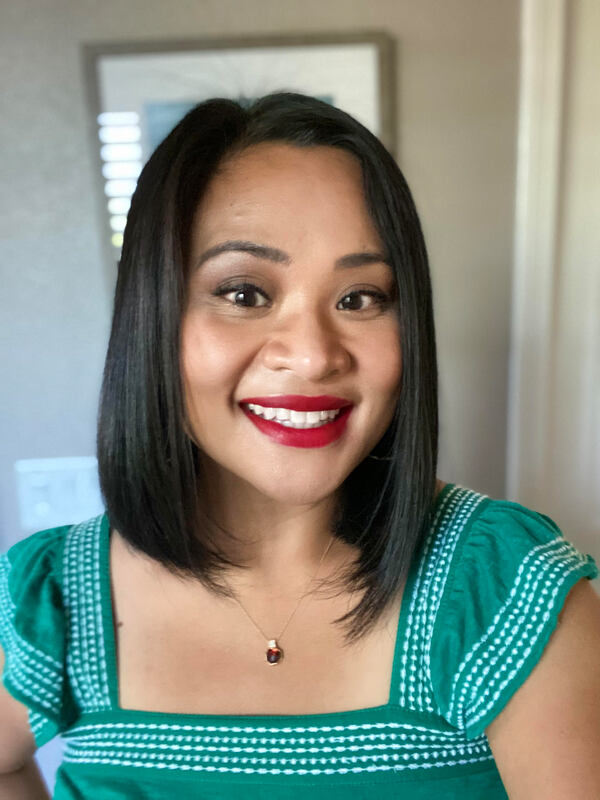 Jackie, a Licensed Clinical Social Worker, specializes in treating infertility patients and those experiencing reproductive loss in her therapeutic practices.
Jackie, a Licensed Clinical Social Worker, specializes in treating infertility patients and those experiencing reproductive loss in her therapeutic practices.
What sparked your interest in working specifically with clients experiencing infertility?
I’m deeply committed to serving the Infertility community after experiencing the frustration and emotional toll of infertility myself. When I was in the midst of treatment, I realized how few therapists were specifically trained in fertility counseling. Also, I needed someone across from me who could truly say, “I understand what you’re going through”. Being able to feel that you can identify with your therapist creates a stronger connection, thus a greater sense of relief. Infertility treatment is stressful on your emotional wellbeing. There are losses of hopes, dreams, and strain on relationships. I want to be that person to help those who are working through their family building story. Infertility changes you, and I’m fiercely motivated to support and advocate for those going through this life altering situation.
You mentioned the loss of hopes and dreams. Can you talk a little bit more about what that loss means?
Our culture focuses so much on parenting and children. We’re taught that’s having kids is the “normal and natural” progression in life. These are goals, hopes, and dreams. These ideas of becoming a mom or a parent has been engrained in us since childhood. These dreams that many people have, women especially, have been in their hearts for decades. For someone to suggest that it’s not a loss, is completely dismissive.
I’m deeply committed to serving the Infertility community after experiencing the frustration and emotional toll of infertility myself. When I was in the midst of treatment, I realized how few therapists were specifically trained in fertility counseling. Also, I needed someone across from me who could truly say, “I understand what you’re going through”. Being able to feel that you can identify with your therapist creates a stronger connection, thus a greater sense of relief. Infertility treatment is stressful on your emotional wellbeing. There are losses of hopes, dreams, and strain on relationships. I want to be that person to help those who are working through their family building story. Infertility changes you, and I’m fiercely motivated to support and advocate for those going through this life altering situation.
You mentioned the loss of hopes and dreams. Can you talk a little bit more about what that loss means?
Our culture focuses so much on parenting and children. We’re taught that’s having kids is the “normal and natural” progression in life. These are goals, hopes, and dreams. These ideas of becoming a mom or a parent has been engrained in us since childhood. These dreams that many people have, women especially, have been in their hearts for decades. For someone to suggest that it’s not a loss, is completely dismissive.
Reproductive loss is the loss for the hoped-for life and child. There are no tangible memories and experiences that you have compared with other type of losses."
- JACKIE F.
What are the most common reasons that someone would initially seek out your counseling services?
When the stress becomes too much. Sometimes this is right after a miscarriage, or a transfer not working out. Sometimes it’s the relationship in the home that becomes too overwhelming that an outside perspective is helpful. In regards to miscarriage and reproductive loss, the experience is different. This is someone who’s worked so hard, put in so much time, money, and effort into creating something that is deeply wanted, and the pregnancy isn’t viable. It is devastating. Also, reproductive loss is the loss for the hoped-for life and child. There are no tangible memories and experiences that you have compared with other type of losses.
What makes meeting with an infertility specialist different than meeting with any type of counselor?
The difference is foundational knowledge in the infertility diagnosis, awareness of triggers, and level of empathy. A fertility counselor speaks the infertility language and understands that world. Further, something as simple as word choices can be hurtful. There’s a level of sensitivity that is important working with the fertility community.
What other type of mental health issues arise within the infertility community?
Anxiety and it’s cousin, depression. Infertility is commonly referred to a rollercoaster. Your emotions are up and down. You can be so hopeful at the beginning of a cycle and it can come crashing down quickly when things don’t work out. The stress of treatment is compounded by the actual medication that you’re taking. These shifts in hormone levels are known to cause mood changes. These mood changes are not fun. I’m sure many of the patients can attest to this. Also, the financial burden of infertility treatment are stressful for the couple. IVF is expensive and often aren’t covered by insurance. It can be a really messy journey and I try to help my client’s sort this out.
When the stress becomes too much. Sometimes this is right after a miscarriage, or a transfer not working out. Sometimes it’s the relationship in the home that becomes too overwhelming that an outside perspective is helpful. In regards to miscarriage and reproductive loss, the experience is different. This is someone who’s worked so hard, put in so much time, money, and effort into creating something that is deeply wanted, and the pregnancy isn’t viable. It is devastating. Also, reproductive loss is the loss for the hoped-for life and child. There are no tangible memories and experiences that you have compared with other type of losses.
What makes meeting with an infertility specialist different than meeting with any type of counselor?
The difference is foundational knowledge in the infertility diagnosis, awareness of triggers, and level of empathy. A fertility counselor speaks the infertility language and understands that world. Further, something as simple as word choices can be hurtful. There’s a level of sensitivity that is important working with the fertility community.
What other type of mental health issues arise within the infertility community?
Anxiety and it’s cousin, depression. Infertility is commonly referred to a rollercoaster. Your emotions are up and down. You can be so hopeful at the beginning of a cycle and it can come crashing down quickly when things don’t work out. The stress of treatment is compounded by the actual medication that you’re taking. These shifts in hormone levels are known to cause mood changes. These mood changes are not fun. I’m sure many of the patients can attest to this. Also, the financial burden of infertility treatment are stressful for the couple. IVF is expensive and often aren’t covered by insurance. It can be a really messy journey and I try to help my client’s sort this out.
Infertility is a disease, but it is treated differently as if it’s a choice, an elective treatment in our country. Spending money and borrowing money to pay for something that can provide no guarantee of a successful outcome is anxiety provoking, demoralizing, and can leave you feeling hopeless."
- JACKIE F.
Tell us more about the financial impact of a client’s emotional health.
Finances play an important part in the infertility journey. It’s an unfair reality that money is a factor in whether someone can fulfil their dream of becoming a parent. Infertility is a disease, but it is treated differently as if it’s a choice, an elective treatment in our country. Spending money and borrowing money to pay for something that can provide no guarantee of a successful outcome is anxiety provoking, demoralizing, and can leave you feeling hopeless.
How can we support our friends and family experiencing infertility better?
By telling them that you are there for them and truly listening. Please stop asking others “when are you going to settle down and start a family?” Can we all agree that asking a couple about their family building plans is none of our business. Offering unsolicited advice is unproductive. Suggesting someone to ‘ just relax’ places blame on that person as if they are at fault for their infertility. Just say, “I love you. I am here to listen whenever you are having a hard time.”
Why do you think financial assistance would make a difference in someone’s infertility journey?
It makes a world of difference! There is a weight lifted off their shoulders and helps with the financial toll of treatment. Sometimes couples are forced to delay treatment because they simply can’t pay the bill. And as any infertility patient understands in this process, time is of the essence. With every year that goes by, egg quality changes and can negatively affect the likelihood of success. So, if we provide some help in order to keep these couples moving forward on their family building journey, it would be tremendous.
Thank you to Jackie - and all mental health professionals, who recognize the complexities of infertility and the importance of caring for the whole patient! We hope this piece will inspire anyone experiencing infertility to seek out the support and help that they may need.
Finances play an important part in the infertility journey. It’s an unfair reality that money is a factor in whether someone can fulfil their dream of becoming a parent. Infertility is a disease, but it is treated differently as if it’s a choice, an elective treatment in our country. Spending money and borrowing money to pay for something that can provide no guarantee of a successful outcome is anxiety provoking, demoralizing, and can leave you feeling hopeless.
How can we support our friends and family experiencing infertility better?
By telling them that you are there for them and truly listening. Please stop asking others “when are you going to settle down and start a family?” Can we all agree that asking a couple about their family building plans is none of our business. Offering unsolicited advice is unproductive. Suggesting someone to ‘ just relax’ places blame on that person as if they are at fault for their infertility. Just say, “I love you. I am here to listen whenever you are having a hard time.”
Why do you think financial assistance would make a difference in someone’s infertility journey?
It makes a world of difference! There is a weight lifted off their shoulders and helps with the financial toll of treatment. Sometimes couples are forced to delay treatment because they simply can’t pay the bill. And as any infertility patient understands in this process, time is of the essence. With every year that goes by, egg quality changes and can negatively affect the likelihood of success. So, if we provide some help in order to keep these couples moving forward on their family building journey, it would be tremendous.
Thank you to Jackie - and all mental health professionals, who recognize the complexities of infertility and the importance of caring for the whole patient! We hope this piece will inspire anyone experiencing infertility to seek out the support and help that they may need.
June 3, 2021
"I AM GOING TO BE A MOM, THANKS TO THE STORK FOUNDATION." -Savanah's Story
Savanah and Jared were surprised when they were diagnosed with infertility but were shocked when they heard the price tag to treat their diagnosis. With great careers, they considered their insurance plans to be competitive but infertility treatment was not covered by their medical insurance. They were awarded our first fertility grant in November 2020. With gratitude for our donors, Savanah and Jared are now expecting a baby girl in Fall of 2021.
|
Tell us about you and your husband, Jared and what led you to the Stork Foundation for Infertility.
Jared and I met in high school and dated throughout college. I am a Nurse and he works for Spire Gas in St. Louis. Because we had been dating for so long, we knew we wanted to start a family right away. It didn’t happen that way though, which of course we were surprised by. I talked to my doctor and there wasn’t too much concern because we were really still young. We did some testing and everything looked normal. We tried another year and then were referred to a fertility specialist. I had to go to countless appointments so while most people in my life did not know our fertility struggles, my co-workers did. One of my co-workers actually saw a post from The Stork Foundation on Facebook right around the time we knew we would have to pursue IVF. You mentioned that many people close to you did not know about your fertility struggles. Why did you choose to not share?
The people who are closest to me wanted us to have a baby so much, too. It was a really hard time for me and I just didn’t want to put that grief on them as well. Family is a shared experience. I’m not saying that keeping it private was the best thing to do for everyone either. I was very lonely at some points in this journey. Unfortunately, our treatments started at the beginning of the COVID-19 crisis so I had to attend all of my appointments by myself, without my husband. There were many moments that I had to receive bad news, completely alone. |
Because of the COVID restrictions, Jared could not attend the appointments with me so he was somewhat disconnected from the actual process. For me, it felt was all consuming - physically, emotionally, everything."
-SAVANAH
Most couples have a very different experience when pursuing infertility treatments. Can you share how you and Jared processed this differently?
Because I was attending so many doctor’s appointments, checking blood work, getting ultrasounds, I questioned everything going on with me physically; I was always wondering if I was pregnant or if my body was responding to the medication. Because of the COVID restrictions, Jared could not attend the appointments with me so he was somewhat disconnected from the actual process. For me, it felt was all consuming - physically, emotionally, everything. On Mother’s Day of last year, I learned that we would need to pursue IVF after yet another failed pregnancy. This was especially heartbreaking for me. He was disappointed but also very supportive of me. It felt more ‘real’ to him once we had confirmation of our pregnancy and I think it finally really set in once we found out we were having a baby girl!
Because I was attending so many doctor’s appointments, checking blood work, getting ultrasounds, I questioned everything going on with me physically; I was always wondering if I was pregnant or if my body was responding to the medication. Because of the COVID restrictions, Jared could not attend the appointments with me so he was somewhat disconnected from the actual process. For me, it felt was all consuming - physically, emotionally, everything. On Mother’s Day of last year, I learned that we would need to pursue IVF after yet another failed pregnancy. This was especially heartbreaking for me. He was disappointed but also very supportive of me. It felt more ‘real’ to him once we had confirmation of our pregnancy and I think it finally really set in once we found out we were having a baby girl!
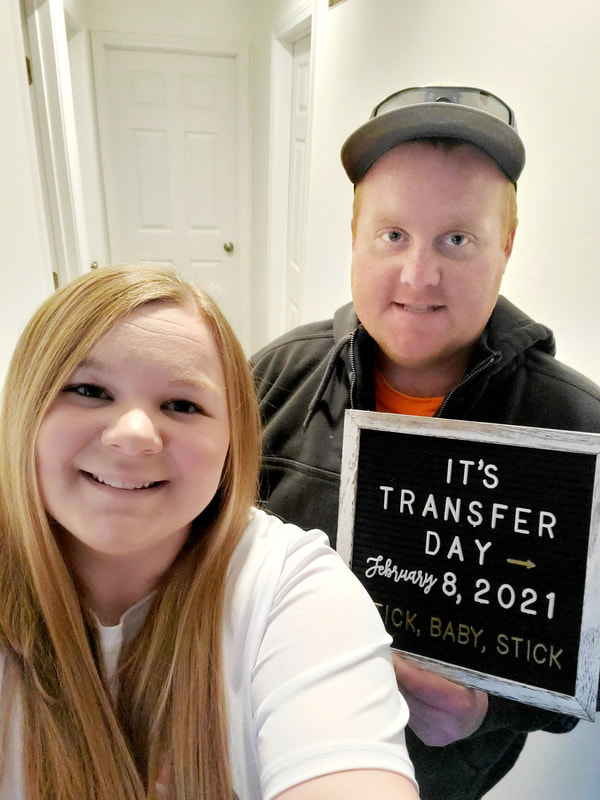 Jared and Savanah before their embryo transfer procedure. Because of COVID-19 restrictions, Jared was unable to attend most of Savanah's appointments.
Jared and Savanah before their embryo transfer procedure. Because of COVID-19 restrictions, Jared was unable to attend most of Savanah's appointments.
You completed several IUI treatments unsuccessfully and then started the process to pursue IVF when you submitted your application to the Stork Foundation. Was that an easy decision?
It felt like the toughest decision, but the right decision for us. We knew that if we were not awarded the grant, we would still pursue IVF. We do not have fertility coverage and the cost difference between IUI and IVF is astronomical. We were able to seek out help at a nurse driven clinic which did save us quite a bit of money but it was still very expensive.
What does the grant from The Stork Foundation mean to you?
We were so nervous when we were completing the application because we knew what it would mean to us if we were chosen. When we set up the ‘interview’ – where you surprised us by letting us know that we would be grant recipients, we were completely shocked. As you could see, it was a very emotional moment for us. We knew it was going to change our lives. We would have to take out loans to be able to complete IVF. The stress of no guarantees, a possibility of having an unsuccessful IVF with loans on top of it was terrifying. Pursuing IVF with a grant was an unimaginable weight off our shoulders. The grant also means so much to my entire family. My mom, my grandmother, both of our families were just as thrilled and grateful as we were to be able to receive this grant.
It felt like the toughest decision, but the right decision for us. We knew that if we were not awarded the grant, we would still pursue IVF. We do not have fertility coverage and the cost difference between IUI and IVF is astronomical. We were able to seek out help at a nurse driven clinic which did save us quite a bit of money but it was still very expensive.
What does the grant from The Stork Foundation mean to you?
We were so nervous when we were completing the application because we knew what it would mean to us if we were chosen. When we set up the ‘interview’ – where you surprised us by letting us know that we would be grant recipients, we were completely shocked. As you could see, it was a very emotional moment for us. We knew it was going to change our lives. We would have to take out loans to be able to complete IVF. The stress of no guarantees, a possibility of having an unsuccessful IVF with loans on top of it was terrifying. Pursuing IVF with a grant was an unimaginable weight off our shoulders. The grant also means so much to my entire family. My mom, my grandmother, both of our families were just as thrilled and grateful as we were to be able to receive this grant.
Pursuing IVF with a grant was an unimaginable weight off our shoulders. The grant also means so much to my entire family. My mom, my grandmother, both of our families were just as thrilled and grateful as we were to be able to receive this grant."
-SAVANAH
Our generous donors are the inspiring individuals who have made this journey to parenthood possible for Jared, Savanah and other hopeful 'parents in waiting'. We thank both Savanah and Jared for sharing their story. Congratulations!
April 21, 2021
"I AM A PROUD IVF BABY." - Andrea's Story
"I AM A PROUD IVF BABY." - Andrea's Story
|
The Stork Foundation for Infertility was contacted by 15 year old Andrea from New York City about a community service project required by her high school, Marymount School of New York. She wanted to raise money for our grant recipients. Why? Because after years of trying and several rounds of infertility treatment cycles, she was finally conceived through Invitro Fertilization in 2005. She has been baking and selling cupcakes to support our organization, one that has great significance to her own family story. We talked with Andrea about her passion for infertility advocacy and her experience coming to know how hard her parents fought to have her as their daughter.
Why did you want to connect with the Stork Foundation to complete your community service hours? My parents, Rafael and Martha, conceived me in 2005 through IVF after pursuing infertility treatments for three years. My mom was diagnosed with ‘unexplained infertility’. They had several IUI cycles and failed IVF cycles. They conceived me on their 4th and final attempt at IVF. I was really motivated to seek out organizations that supported individuals who need to pursue infertility treatments because I know how costly they can be. Thankfully, my parents were able to just barely afford their own fertility treatments and even then, they used pretty much all their savings at the time to have me. They did have a little bit of insurance to pay for some, but it was not enough because it was such a long process for them.
As I learned more about infertility, I think I just felt more grateful for infertility treatments. When you found out that you were conceived through IVF, did you feel any ‘different’?
I am Hispanic and have always felt that my cultural background has made me unique and different. I think that this news just reinforced how unique I am and I took the news as something that is special about me. A lot of children born through IVF are twins or even triplets. During the only successful IVF cycle my parents had, they were only able to retrieve five eggs and the eggs were extremely small – the odds weren’t in their favor, but I am one of those five eggs. As I learned more about infertility, I think I just felt more grateful for infertility treatments.
When promoting your fundraiser, have you been open about the fact that your parents struggled with infertility?
I am promoting this as a way to support a foundation and a worthy cause. I am really proud of my parents and not shy about the fact that I am an IVF baby. My parents are one of the few that have been able to seek out infertility treatments and I think that makes an incredible story. I have had so much support already, especially from neighbors, friends and even medical doctors have been buying cupcakes for their entire office to support The Stork Foundation.
We want to extend a sincere 'thank you' to Andrea and her parents for sharing their journey to parenthood. By being so open and vulnerable with your story, we truly believe that you are changing the conversation and removing the stigmas around infertility.
|
December 10, 2020
BALANCING A CAREER AND INFERTILITY, WHEN IVF IS A FULL TIME JOB
Most women do not face the awkward conversations of “trying for a baby” with their employer, but many who battle infertility are forced to open up about these personal struggles because of the schedule demands of infertility treatments. These vulnerable conversations can ignite unforeseen emotions and fears. With the high cost of treatment, financial needs are heightened and employment is necessary. Kristine shares her story about how infertility changed her career.
Tell us about your journey in being diagnosed with infertility.
|
I have a son who is 14 years and my pregnancy with him was unexpected. We had no complications whatsoever and honestly, having a baby just seemed so easy. When I re-married several years later and decided to grow our family with my new partner, we did all the things that they say to keep track of to get pregnant quickly. When I hit the six month mark, I knew things didn’t make sense and wanted to figure out what was preventing us from getting pregnant. I was 36 years old at this point and did not want to lose any time. When we saw our first clinic, they ran all of the basic labs with both of us and everything looked fine. I didn’t know what it was at the time, but I just had an intuitive sense that something just was not right. I also knew that my husband faced infertility in his previous marriage but they did not go through any treatments. I just knew that this issue coming up again with me, the right thing to do was to see a fertility specialist right away.
|
Many people who suffer from infertility need to continue to work, whether it is because of insurance coverage or the high expense of treatments that are sometimes not covered at all.
We were fortunate in that we did have insurance coverage. However, even with insurance coverage, it has been so expensive. I don’t know how this disregard is so widely accepted and I still cannot wrap my mind around it. Even with our coverage, one year we had to pay over $14,000 in out of pocket expenses. That was with what we consider to be an excellent insurance plan for infertility.
You were working this entire time as a Clinical Psychologist and also as a Dean of a Doctoral of Psychology program, with clients, students and colleagues depending on your availability. How did pursuing infertility treatments impact your schedule?
|
It was so challenging. When I first started IVF, I was the Dean of our program. My husband and I also own a private practice and have a case load of clients that I am responsible for. Being a Dean was the best role that I could have hoped for in the academic side of my career but I had to step down from this position into another role because of the demands of infertility. It was incredibly hard to make this decision.
|
At one point while going through IVF treatments, I was very publicly condemned by a high-level colleague at the University I was working for because she felt I was not available enough. I was working 60+ hours a week in addition to a difficult and time-consuming commute... |
At one point while going through IVF treatments, I was very publicly condemned by a high-level colleague at the University I was working for because she felt I was not available enough. I was working 60+ hours a week in addition to a difficult and time-consuming commute from the suburbs to downtown Chicago. I had previously opened up to her about our infertility struggles and I shared a lot of the IVF process with her. Looking back, I think she heard me and tried to understand it, but on a practical level did not know what this process would look like day to day.
When she came down on me in such a public way, I knew from that moment on that I needed to reevaluate and make a change to keep up with the demands of my family, my career and my responsibility to students and clients, while attending all of the ever changing doctor appointments. It was really stressful, which is not helpful when going through the infertility treatments.
When she came down on me in such a public way, I knew from that moment on that I needed to reevaluate and make a change to keep up with the demands of my family, my career and my responsibility to students and clients, while attending all of the ever changing doctor appointments. It was really stressful, which is not helpful when going through the infertility treatments.
The process of going through IVF can be very unpredictable. How did you manage that juggle?
You cannot plan your schedule, even day by day. Whether you are doing a stimulation protocol or preparing for a transfer, the appointments change so quickly based on how your body is responding. Not only do you have to keep up with fluctuating appointments, but you cannot predict how the medication is impacting you or even the emotional toll that you carry with you constantly. I remember one time while I was at work, I was waiting for a doctor to call me with an important update on how we would be able to move forward. I could hardly focus all day with the anticipation of the call and overthinking how I would emotionally respond while being at work, right next to a male colleague, the rest of the day. I was bound to a commuter schedule so getting up and leaving was not always an option either. It consumed my thoughts and I could not focus whatsoever.
You mentioned the medication side effects. Did you ever feel like these side effects had any consequences at work?
Definitely. The medication effects your hormones and creates such a fogginess over you. People talk about being bloated and some of the physical effects, but you are also just not your normal self. I often felt very forgetful, even just struggling with finding the right words to say which is not ideal in my profession. I did not anticipate how the medications would impact me cognitively. I had to really show myself a lot of grace throughout the process.
Did many of your colleagues or co-workers know you were going through infertility or the IVF process?
I remember feeling like I needed some time to process the loss. For me, it was such a personal loss and I did not have time to grieve like I would be given if I had lost another family member. Naturally, people would expect me to take off some time to process and grieve. We prepared so long for that pregnancy and I cannot describe the pain I felt. |
I was really selective on who I shared my journey with. I told my immediate supervisor because I really felt like she needed to know so that she wouldn’t assume that I was undependable. She shared some of her own struggles which was really comforting. After opening up with her, I shared with a few other coworkers as well. After our third transfer ended in a miscarriage, I did not tell anyone else anything because the miscarriage was such a painful experience. Those people who knew I was going through IVF wanted to be supportive and checked in with me by asking how it was going. I felt obligated to share that we miscarried or update them on our process, like I needed to tie up the loose ends of our story.
|
Some people who I opened up to about my miscarriage were able to sit in the pain and loss with me, but some were really not. Some people felt very uncomfortable when I told them about the miscarriage and I was tired of having these awkward conversations. I eventually found a balance of how I communicated and shared our infertility journey. I had to consider what level of detail I wanted to get into ahead of time so that I knew how others might expect me to update them further along in the process. It was really difficult to find that balance. I also know that it can be awkward on the other side, too. People genuinely want to show support but also don’t want to pry either. It is definitely a dance.
Now you’re pregnant with TWINS! How did you share this news?
|
We shared at 13 weeks. I did share our infertility journey and our loss when we announced. I felt like it was important to share our journey because it was like I wanted to prime our friends and family to let them know that if this pregnancy does not work out – I will need a lot of support. Being pregnant with twins, I showed pretty early on and I could not hide it much longer anyways. Every appointment, I felt like I was holding my breath. I was terrified at every ultrasound appointment and because of COVID, my husband could not come to a lot of our appointments with me. When we found out that we were having twins, I had to FaceTime him. I was so fearful that if there was a problem, I would have to face any news by myself and then have share the news with him.
|
We remembered Pregnancy and Infant Loss Awareness month in October. Is there anything you would like to share about your experience with loss and how that impacted the way that you opened up to others?
I remember telling my husband that I wished we talked about miscarriage more because I remember feeling like I needed some time to process the loss. For me, it was such a personal loss and I did not have time to grieve like I would be given if I had lost another family member. Naturally, people would expect me to take off some time to process and grieve. We prepared so long for that pregnancy and I cannot describe the pain I felt. It is apparent that many people do not consider a miscarriage a real loss. There are a lot of social norms, rituals and public ceremonies to honor loss in our culture, but for some reason miscarriage is not seen as a true socially accepted loss.
Thank you to Kristine for opening up about your family, grief and the demands of infertility.
October 19, 2020
HOPEFUL MOM OPENS UP ABOUT THE DIAGNOSIS MOST PEOPLE DON’T WANT TO TALK ABOUT
When MaryAnn was first diagnosed with infertility, she was hesitant to share her journey. Because infertility has such an impact on daily schedules and managing a career, she started opening up. Through candid conversations at work or online, MaryAnn found financial resources, friendship and a support system to vulnerably walk through her infertility journey with.
Can you share a little bit about your journey to being diagnosed with infertility?
|
When we started to try in 2015, My husband and I were both 39 years old. My husband had a few factors that make it a little bit more difficult to conceive naturally, and I have a luteal phase defect and low progesterone. I have not been diagnosed with diminished ovarian reserve, but my age has always been a factor. Even though I get a decent number of follicles each month, a higher percentage of eggs are abnormal after age 40 and we are 44. We have done so many tests above and beyond what any doctor ever wanted to test, in attempt to figure out the source of what our issues are. Immune issues on my end seem to be the culprit, and we managed to improve the male factor issues somewhat, but we had a feeling the egg and sperm were having problems actually meeting up, which is why we eventually moved to IVF after trying naturally for a few years.
|
Feeling hopeful and completing another round of infertility treatments to become parents.
|
With all of the tests you had, I can only imagine how much time that took away from your daily grind and work schedule. Were you open about your diagnosis initially? Did you feel that disclosing your story was a choice that you made?
I was working as an Instructional Designer. We were trying naturally and I shared this with only a few of my co-workers. My direct manager had very strict in-office hours – starting at 8:00am sharp – with no flexibility or tolerance for arriving even a little late. When I began my initial infertility testing, I learned about the uncertain scheduling of all the blood work appointments that have to be based on your cycle days. I tried to give my manager a heads up by saying “I have a medical issue and I’m going to need to get a bunch of bloodwork done this week and will be late, probably every other day.” Well of course this raised red flags and he instantly started asking me, “Are you okay?” He was very worried and he kept prying. He even asked if I had cancer. I finally wrote him an email that included words like ovulation, progesterone, periods. It was super uncomfortable but I felt I just had to tell him the entire story of what was going on. It was frustrating that I had to tell him. I have a great reputation in my profession – I am reliable and a team player. In the end, he was caring and understanding, even though he did not have any experience with infertility with his wife. Because I had opened up and shared my situation with him early on, when I had a more serious laparoscopy surgery scheduled, it was a much easier conversation and alleviated a lot of my work stress. He even sent me a card which was totally unexpected!
Did your level of comfort with sharing your infertility diagnosis evolve over time or do you think it was situational?
|
Probably both, but I definitely had a different approach when discussing infertility at work. When I started IVF in 2018, I was working at Discover. They were very flexible with the scheduling which was a big change for me. I opened up to my new manager right away, but because I was new, I was not sure how it would be received. She was so happy for me and really encouraged me to pursue treatments. She told me, “just mark off your calendar for whatever you need.” She was incredibly compassionate for what I was going through.
|
I tried to not talk about it too much at work so that no one would assume it was a major distraction or that I was not completing my work. I did make a big effort to really show that this was not interfering with my productivity. |
Again, being a newer employee, I tried to not talk about it too much at work so that no one would assume it was a major distraction or that I was not completing my work. I did make a big effort to really show that this was not interfering with my productivity. When I would have one on one conversations, I would be more open and discuss it if it came up.
Besides a more open line of communication, what did you gain by sharing your story?
If I was having a bad day, it felt good to take a bit of time and talk to my co-workers about what I was going through. I needed support and when I started opening up, I realized that there were so many people I could lean on, and we really connected. When I had a miscarriage and shared, I found out my coworker also had a miscarriage. I ended up learning that five of my co-workers had gone through IVF.
We really bonded by sharing not only our experiences with one another but also resources. One co-worker used the Marketplace plan as a secondary insurance option which helped her significantly offset her treatment costs. She also shared a financial resource that ended up covering four of my egg retrievals. Without this help, there is no way I would have been able to come as far as I have in my treatments..
“If I was having a bad day, it felt good to take a bit of time and talk to my co-workers about what I was going through. I needed support and when I started opening up, I realized that there were so many people I could lean on, and we really connected. ”
We really bonded by sharing not only our experiences with one another but also resources. One co-worker used the Marketplace plan as a secondary insurance option which helped her significantly offset her treatment costs. She also shared a financial resource that ended up covering four of my egg retrievals. Without this help, there is no way I would have been able to come as far as I have in my treatments..
“If I was having a bad day, it felt good to take a bit of time and talk to my co-workers about what I was going through. I needed support and when I started opening up, I realized that there were so many people I could lean on, and we really connected. ”
— MARY ANN
Besides in your work circles, how else have you been able to share your infertility journey?
Even though I would now consider myself completely open about my struggles, I was less willing to share at the beginning. I am now involved in online communities to support others but also find support myself. I have participated in and led support groups through Resolve, a national infertility community.
Knowing what you know now, would you provide any advice to someone who is just starting on their journey to parenthood, specifically when it comes to speaking out about infertility?
|
If I had shared my story more openly and become involved with the community early on, I may have learned from others stories and started IVF earlier. We spent a lot of time and money trying to figure things out and avoiding medical intervention for 3.5 years. I thought that my body would just figure it out; I was just way too stubborn and wanted to figure it out myself. When the doctors at my clinic suggested IVF, I should have listened and at least had an egg retrieval done sooner. I just did not have anyone to really talk through this decision with at the time.
My advice would be - if someone asks you if you have children and you do not because of infertility issues, I would suggest at least hinting at it. “We would love to have kids and are trying but are having a little bit of trouble” is a quick way to invite people in a bit and by doing that, you can find so much support, networks and resources. Of course, you will find some people who just do not get that infertility is a medical diagnosis. Some people will tell you to “relax and it will happen”. But by simply saying that you’re having a problem, it can open up a lot of doors for you and be very empowering. You don’t always know what is going on behind the story of a person and the life plans they are working so hard to achieve.
|
The infertility battle is incredibly physically demanding. MaryAnn found support in her husband to maintain physical health during infertility treatments.
|
By simply saying you’re having a problem, it can open up a lot of doors for you and be very empowering.
— MARY ANN
Thank you Mary Ann for bravely sharing your story with hopes to empower others, provide hope and change the conversation about infertility!
June 28, 2020
MOTHER OVERCOMES FINANCIAL BURDENS OF INFERTILITY, ONE COFFEE AT A TIME
When Erynn and her husband, Andy were pursuing infertility treatments, they were overwhelmed with the costs despite having what they thought was extensive medical insurance coverage. With the natural determination of a mother, Erynn, a full-time dental assistant, decided to get creative and picked up an additional part-time job at Starbucks to get their infertility insurance. She opens up about her fight to become a mom with hope to bring awareness to the lack of resources many people with an infertility diagnosis face.
Tell us about your journey that ultimately led to your infertility diagnosis.
After my husband and I were married, we started trying for a family right away. After nine months of trying with no luck and consulting with multiple doctors, I was diagnosed with ‘unexplained infertility’. We tried everything, including eight $800 Intrauterine Insemination (IUI) procedures. Nothing was working so we were referred to another OBGYN specialist who also told me I had ‘unexplained infertility’. I couldn’t settle on that diagnosis. Something inside me knew that there was something more going on so after pushing for further testing, I was finally diagnosed with diminished ovarian reserve. I was 31 years old but had the eggs of a 49 year old. I had always joked that I was an old soul. Well, I guess I am an “old soul” but didn’t realize how old I really was!
When you were diagnosed with diminished ovarian reserve, did you pursue In Vitro Fertilization (IVF) right away?
The specialists told me that IVF was the only next step for us, which we knew we would pursue right away. Then they told us the cost, around $21,000. My husband had fantastic insurance and we were blown away with the lack of coverage. We agreed that we could pursue IVF once because that was all we could afford. Even still, we put this first round of IVF on a Southwest credit card. We wanted points so we could go on a baby moon! We thought it was a straightforward route. We laugh about those plans now!
What were some of the emotions you felt when you were trying to find answers? Did your husband share with you the emotions he felt?
I was really mad to be honest. I was mad at my body and I was mad at God.
|
Vertical Divider
|
My whole life, I wanted to be a mom. It was my version of the “American Dream”. Why couldn’t it be so simple? We talked a lot about how we wish we could turn back time – meet earlier in life, get married sooner, start trying sooner. We just never thought I would have these infertility issues until we started trying. At my age with no prior related diagnoses, it was completely unexpected.
|
It’s one thing to want a family but it’s another thing to have enough strength in your marriage to go through hell to create your family. We had to be on the exact same page. He was supportive of the end goal and remained positive for me.
Infertility is devastating and it can really put a strain on marriages. I have seen many couples divorce as they faced their own struggles with infertility. It is so important to communicate and check in with each other throughout the process.
Infertility is devastating and it can really put a strain on marriages. I have seen many couples divorce as they faced their own struggles with infertility. It is so important to communicate and check in with each other throughout the process.
Many people who have not gone through infertility do not know how delicate the process is and also so different for everyone. What was your IVF journey like?
The first round of IVF was overwhelming and heartbreaking. After everything we had gone through with medications, tests, injections, we did not even make an embryo to transfer. We said we would never do it again, but six weeks later we went back to the doctor. We were not ready to give up on becoming parents yet.
|
Vertical Divider
|
But financially, we were still struggling with the cost of IVF so at that point we sought out other options; we were able to obtain a line of credit through our bank. In the end, we pursued four rounds of IVF cycles with this line of credit. Out of these four, we were only able to create one embryo to transfer. Unfortunately, this embryo didn’t stick and we were not able to get pregnant so we were back to square one. We had exhausted our financial resources well beyond what we had even prepared for.
|
Did your insurance cover the tests, etc. up to the point you were diagnosed?
They only covered the tests to confirm infertility diagnosis. They didn’t cover anything else, including the medication. At one point during the process, I had to get a single testosterone injection to grow follicles (follicles are in the ovary, and they grow the eggs), which cost about $900. These injections are actually more common than one would think but I needed it for IVF. When talking to the pharmacy about the cost, the pharmacist commented on my insurance coverage that they already had on file. The testosterone injection would have been completely covered if I was preparing for a different surgery, such as a gender reassignment, but for infertility it was not covered. I couldn’t believe it -- a medical doctor had diagnosed me with diminished ovarian reserve and was treating me for it using testosterone but yet, it was not covered by my insurance. It felt very unfair.
So financially, there were some monumental barriers. Was there a moment where the “fight” kicked in, not allowing financial barriers get in the way of becoming a Mom?
|
Vertical Divider
|
Even though we had gone through four rounds of IVF with no baby, I did have some hope because one of the times we did actually make an embryo to be transferred. This was the hope I tightly hung on to so that I could keep going, even amidst the scramble to figure out how to pay the financial cost. It was around that time I also found out about Starbucks and their infertility insurance ($20,000 benefit!) for part-time employees. This news felt like a new offering of hope. If I had to work at Starbucks to keep fighting, then so be it. I couldn’t give up; this was just what I knew I needed to do.
|
It was around that time I also found out about Starbucks and their infertility coverage for part-time employees. This news felt like a new offering of hope. If I had to work at Starbucks to keep fighting, then so be it. I couldn’t give up; this was just what I knew I needed to do. |
Erynn showing off her baby bump and Starbucks uniform.
|
How did you hear about the fertility benefits and then decide to work at Starbucks?
I was trying to seek out some infertility support groups and there were many groups on Facebook. One in particular mentioned something about employers covering infertility through their insurance, including Bank of America, Wells Fargo, and Starbucks for part-time employees. I am a full-time Dental Assistant and could not afford to give up my career either. I knew it would be hard but it was also worth it to me. In the end, I had to work 20 hours a week or 240 hours in a 90-day window to meet the audit and to be covered by the Starbucks group insurance. It took a total of 5 months of working there to have the insurance which included the $20,000 infertility coverage. When I interviewed for the job, the store manager did not even know that they covered infertility, which really shows how much infertility is not talked about!
What was that experience like, working full-time and then part-time for Starbucks just to make a baby?
It was so hard. I was waking up at 3am to get to Starbucks early so I could then go to my full time job. I did everything from cleaning toilets to making over the top complicated drinks. My paycheck went entirely to insurance. Of course, there were some pretty rude customers. I remember thinking, I am exhausted and working here for only a 10% chance of having a baby – can you please be a little bit more patient with me?! It is not an easy job!
I was really open about why I was working two jobs and my coworkers were so supportive and gave me more support than I even realized at the time!
I was really open about why I was working two jobs and my coworkers were so supportive and gave me more support than I even realized at the time!
You now have a beautiful daughter and have become a Mom. What would you tell anyone who has been just diagnosed with infertility?
Well first and foremost, one thing that infertility has taught me that I will teach my daughter is to never give up on your DREAM. You will find your way if you work hard and fight for it.
|
Vertical Divider
|
For anyone else, I would encourage them to keep going and keep fighting. The very first round I remember having boundless hope. There is a large chance that it won’t work the first time. The first time is determining how your body responds to fertility treatments. It is a marathon and not a sprint and the periods of waiting are so awful. You really learn about this through infertility communities. I would tell anyone who was diagnosed to get plugged into a supportive community, online or in person. When you engage with others going through infertility, you realize you are not alone.
|
I would also tell someone at the beginning of the journey that when you finally get your happy ending, you forget so much of the journey. I remembering living by Romans 8:18 verse from the Bible that says, “The pain that you’ve been suffering cannot compare to the joy that you will experience.” It is just so true and it was a great reminder for me to keep pressing on.
All that being said, some women with infertility reach the end of their journey without a child and I support them in that decision to stop. Everyone’s diagnosis, prognosis and fight are different and I do not judge others for choosing another route.
All that being said, some women with infertility reach the end of their journey without a child and I support them in that decision to stop. Everyone’s diagnosis, prognosis and fight are different and I do not judge others for choosing another route.
What do you wish EVERYONE knew about infertility?
I think the main message I would say is that infertility is SO common. Even though it is so common, insurances do not cover the treatment. Even though it is so common, people are often embarrassed to discuss it. Even though it is so common, people are insensitive about what they say or questions that they ask.
|
Vertical Divider
|
Comments like “it’s going to happen if you just relax” are NOT helpful. Relax?! – How can someone truly relax when they are racking up thousands of dollars of debt and putting their body through hell?!?
|
Infertility is the most difficult thing that I have ever faced and I know that it is for many others. Most people who haven’t gone through it don’t really understand just how devastating it is– emotionally, physically and financially.
Thank you Erynn for your vulnerability in sharing the financial barriers that are all too familiar to the infertility community!
May 31, 2020
BEAUTIFUL SURROGACY STORY AMONG BEST FRIENDS SHOWS AN INCREDIBLE GESTURE OF LOVE AND FRIENDSHIP
Friends from college walk with us through our awkward late teenage years and bring us right into the “real world”. While trials and triumphs brought college friends Dana and Stefanie memories to last a lifetime, nothing compares to the journey they took together when Dana was diagnosed with infertility. Stefanie responded to the heartbreak of her friend by sacrificially offering to carry Dana and her husband's child via gestational surrogacy, undergoing in vitro fertilization (IVF) to become pregnant on behalf of Dana.
We had the honor of sitting down with Dana and Stefanie. What follows is an inspiring story of infertility and a truly unbreakable bond of friendship as two best friends navigate this untraditional path to family. Below is an edited excerpt from our conversation.
We had the honor of sitting down with Dana and Stefanie. What follows is an inspiring story of infertility and a truly unbreakable bond of friendship as two best friends navigate this untraditional path to family. Below is an edited excerpt from our conversation.
Dana, take us back to the beginning of your infertility struggle and the steps that ultimately led to you needing a surrogate.
Dana: I was 28 when my husband Terry and I first decided to start trying to build a family. We were both healthy so we assumed getting pregnant would be easy. After about a year of trying with no luck, it was recommended that we see an infertility specialist who did some initial tests on us both. The results came back normal and did not give a reason for our lack of success. This was frustrating and I know many women are given a similar term of ‘unexplained infertility,’ a vague diagnosis that offers nothing but more uncertainty. The next couple years, Terry and I saw more specialists who conducted additional tests, procedures, and surgeries, all while continuing to try to conceive and maintain hope.
|
Vertical Divider
|
I was finally diagnosed with endometriosis along with a secondary diagnosis of an auto-immune disorder that results in natural killer cells rejecting a successful pregnancy. It was at this point that I had lost all faith that I could carry a child. It is really difficult to put in to words this sort of grief, the fear that the way your life was envisioned, a big part of it being that motherhood piece, may be impossible.
|
Stefanie, tell us about your friendship with Dana and how you became involved in this journey? Was there a moment, exchange, or conversation with Dana that was most meaningful to you that triggered or pushed you to the decision to offer to carry her baby?
Stefanie: I met Dana in college while living in the same residence hall and we have been very close friends ever since. Dana was there for me while I had my three children and throughout this same time, I saw her and Terry struggling to conceive their first and it just did not seem fair. As a younger girl, I had also witnessed both my mom and step-mom struggle with infertility. I am an only child due to my mother’s infertility issues, so I was more aware than most about the heartache Dana was experiencing and how different her life could be because of this medical diagnosis.
Dana was as close as a sister to me and confided in me throughout her battle with infertility. I always had an overwhelming and eager feeling of wanting to ‘fix’ this heartache for her. I had another friend who went through her own infertility journey, finally becoming a mom through the rigorous and costly IVF process, but I knew that due to Dana’s diagnosis she would never have the opportunity to carry her own baby.
|
Vertical Divider
|
At one point, kind of brainstorming, I said to Dana, “Just let me carry your baby!” But in the back of my mind, I knew I could, and would, do it for her. After talking to my husband Ryan, I let Dana know that my offer was serious. I had made up my mind and the decision for me was, almost like a mother’s instinct.
|
Dana: I have never been one to ask for help and I would have never asked for this enormous sacrifice. We were about three and a half years into our journey and all the tests, waiting, and severe diagnoses had left us feeling discouraged and hopeless. When Stefanie offered, it felt, for the first time, as if becoming a mother was actually a possibility. Stefanie’s selfless offer gave me newfound hope.
But getting Stefanie pregnant via surrogacy is a long, intricate medical process as well. Do you remember what it was like to wait and then find out she was pregnant?
Dana: I had to go through a couple months of hormone medication including IVF stimulation shots to prepare for an egg retrieval surgery. The stimulation and retrieval were not as successful as the doctor had hoped. Five eggs were retrieved and only three were able to be fertilized. At 24 hours post fertilization, only one embryo was surviving. However, our luck finally turned on transfer date (day 5). Our fertility doctor came in grinning from ear to ear saying our one remaining embryo was the “embryo of the day”. It is now a running joke in our home. Every time our daughter does something that amazes us we say “egg of the day.”
Meanwhile, Stefanie was going through an equally rigorous medical protocol including taking hormones and intra-muscular progesterone oil shots to prepare her body to accept an embryo transfer. Stefanie then had to continue shots every morning until her ninth week of pregnancy.
To this day, I remember the stoplight I was sitting at when I received the news that the embryo had implanted successfully! It had been such an emotional roller coaster and with this news, I felt a new emotion in this journey – this time relief.
I was able to go to all of Stefanie’s doctor appointments and ultrasounds to witness the miracle of our baby growing. At thirteen weeks, the nurse gave Stefanie an envelope with the baby’s gender written on it. She came to our house that night to do a special gender reveal with just me and Terry.
Meanwhile, Stefanie was going through an equally rigorous medical protocol including taking hormones and intra-muscular progesterone oil shots to prepare her body to accept an embryo transfer. Stefanie then had to continue shots every morning until her ninth week of pregnancy.
To this day, I remember the stoplight I was sitting at when I received the news that the embryo had implanted successfully! It had been such an emotional roller coaster and with this news, I felt a new emotion in this journey – this time relief.
I was able to go to all of Stefanie’s doctor appointments and ultrasounds to witness the miracle of our baby growing. At thirteen weeks, the nurse gave Stefanie an envelope with the baby’s gender written on it. She came to our house that night to do a special gender reveal with just me and Terry.
What were some of the challenges of the gestational surrogacy process?
Stefanie: In the beginning it was all the crazy logistics of the IVF process - medications, timed shots, doctor’s appointments & ultrasounds. My children were 5, 4, and 2 at the time so we had a lot of family support – from Dana’s parents and mine – that enabled our family to juggle the new logistics into our schedule.
There isn’t a surrogacy office in St. Louis so with limited resources at hand, Dana and I really had to fend for ourselves in searching for information to guide us through this journey. We were very lucky that we had each other to tackle this ‘information gap’ together.
There isn’t a surrogacy office in St. Louis so with limited resources at hand, Dana and I really had to fend for ourselves in searching for information to guide us through this journey. We were very lucky that we had each other to tackle this ‘information gap’ together.
|
Vertical Divider
|
From an emotional side, I often had feelings that I really wasn’t fixing the problem for my friend. Even though I was carrying her child – their embryo, I wasn’t able to ‘fix’ the fact that Dana was not going to get to experience carrying her baby. That was heartbreaking for me, and in some ways it was hard for me to be pregnant again, knowing that Dana couldn’t be.
|
Dana: I had to give up all control! I remember going to Stefanie’s house with my carefully selected groceries one night and she looked at me and said, “If you’re going to tell me what type of milk to drink, this is not going to work!” I probably drove her crazy! I brought her pineapple the day of the transfer and walnuts to ensure she was getting enough omegas!
Even though I obviously trusted Stefanie completely, I had to learn to deal with the lack of ANY sort of control over the pregnancy. Surrogacy is a partnership and I could not be with Stefanie 24/7 and in charge the whole way through. Thankfully Stefanie and I had years of a strong friendship and level of trust built; I knew she was truly invested in bringing my baby into the world. We also communicated regularly, just as we always have, so I could stay up to date on the baby’s growth and how Stefanie was feeling.
Even though I obviously trusted Stefanie completely, I had to learn to deal with the lack of ANY sort of control over the pregnancy. Surrogacy is a partnership and I could not be with Stefanie 24/7 and in charge the whole way through. Thankfully Stefanie and I had years of a strong friendship and level of trust built; I knew she was truly invested in bringing my baby into the world. We also communicated regularly, just as we always have, so I could stay up to date on the baby’s growth and how Stefanie was feeling.
How did others react to your decision to you becoming/using a surrogate? How was your own family involved and how did they support you?
Dana: As suspected, throughout conversations with friends and family, we had to clarify many times that we were becoming parents through gestational surrogacy -- we were still the biological parents and Stefanie was carrying our child. However, our friends and family were extremely supportive and excited.
Stefanie: My parents were not thrilled at first because I had a tough delivery with my youngest. They felt I had a family of four who needed me here, and there are always risks to any pregnancy. They were excited for Dana and Terry but were rightly concerned about my health at the same time. I heard a lot from other people, “I could never give up my baby!” but to me it was NEVER my baby; it was my friends baby. I was just doing my part to help someone else have a family. My husband was extremely supportive throughout the entire process and proud of the joy we were able to bring to our friends through surrogacy. My children were all really excited too. I always say that while it is the woman who is pregnant, the journey of surrogacy takes the whole family's support.
Stefanie: My parents were not thrilled at first because I had a tough delivery with my youngest. They felt I had a family of four who needed me here, and there are always risks to any pregnancy. They were excited for Dana and Terry but were rightly concerned about my health at the same time. I heard a lot from other people, “I could never give up my baby!” but to me it was NEVER my baby; it was my friends baby. I was just doing my part to help someone else have a family. My husband was extremely supportive throughout the entire process and proud of the joy we were able to bring to our friends through surrogacy. My children were all really excited too. I always say that while it is the woman who is pregnant, the journey of surrogacy takes the whole family's support.
What do you remember about that day that you became a Mom?
Dana: I picked Stefanie up early in the morning for a scheduled induction. I will always remember the staff at Memorial Belleville who went above and beyond in treating me equally to Stefanie. During the delivery, Terry and I were both able to be by her side to witness the birth of our daughter. The most memorable part of her birth day was when they laid her on my chest for the first time, skin-to-skin. The connection was immediate even though I had not carried her. This day concluded our 4 year struggle with infertility -- including hundreds of doctors’ visits, tests, and worry and fear that I would never experience motherhood.
What was your favorite part of being a gestational surrogate?
Stefanie: Without question it was knowing the immense joy I was able to bring other people—not just Dana, but her entire family. I was making someone a grandparent, an aunt. I was part of helping create a deep family connection on top of making someone else’s dream of becoming a mom come true. Not everyone has the opportunity to do that and the fact that I could be a part of something so beautiful and life-changing is amazing!
What have you learned from this experience that you might share with others who are facing infertility or know someone who is?
Dana: We just celebrated Mothers’ Day and that day is still so impactful and bittersweet for me. I guess it will always remind me of my own infertility journey and make me think of other’s who are struggling. Walking through infertility myself and then having my daughter through surrogacy was life-changing and left me with an incredible amount of compassion for all mothers.
Stefanie: Having several women close to me face infertility has made me more aware and thoughtful about my wording when speaking with others about building their families. Common questions like, “when do you think you will want kids?” seem harmless but can be very hurtful if we don’t know an individual’s personal circumstances. Because of this journey and experience, my kids are probably more educated on infertility and surrogacy than most and know not to ask questions like this either.
When people learn that I was a surrogate, a surprising number say they also struggled with infertility or know someone who did. This makes me wonder how many people could benefit from using a surrogate. Unfortunately, no one really talks about it as an option.
Dana: I hope our story can serve as inspiration for those couples who are currently struggling with infertility, hitting all the roadblocks, losing hope and draining their emotions. I want them to know that it CAN work. There isn’t one right or wrong way to build a family, and there are many options available.
Stefanie: Having several women close to me face infertility has made me more aware and thoughtful about my wording when speaking with others about building their families. Common questions like, “when do you think you will want kids?” seem harmless but can be very hurtful if we don’t know an individual’s personal circumstances. Because of this journey and experience, my kids are probably more educated on infertility and surrogacy than most and know not to ask questions like this either.
When people learn that I was a surrogate, a surprising number say they also struggled with infertility or know someone who did. This makes me wonder how many people could benefit from using a surrogate. Unfortunately, no one really talks about it as an option.
Dana: I hope our story can serve as inspiration for those couples who are currently struggling with infertility, hitting all the roadblocks, losing hope and draining their emotions. I want them to know that it CAN work. There isn’t one right or wrong way to build a family, and there are many options available.

